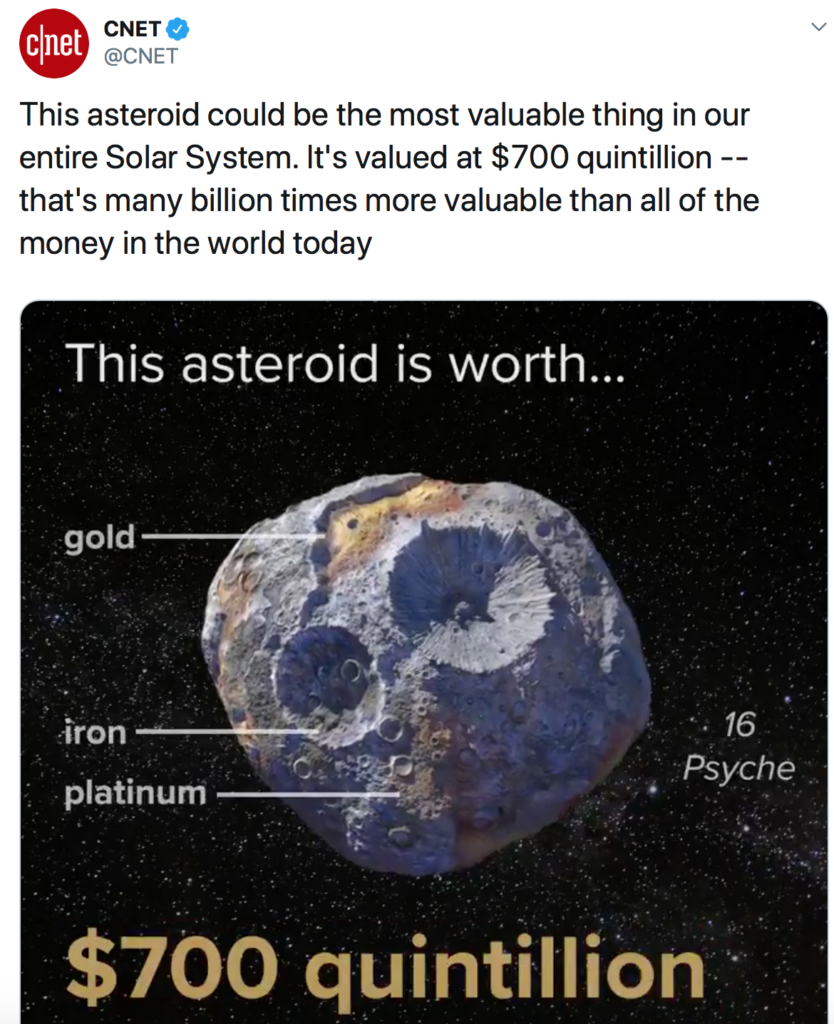On Adam Smith, Bitcoin, and the Wealth of Worlds

Comedian John Oliver once quipped that cryptocurrencies like Bitcoin are, “everything you don’t understand about money combined with everything you don’t understand about computers.” And while this description is surprisingly well put, the truth is that much of what’s “under the hood” of Bitcoin is premised on economic first principles and maxims that have existed for centuries.
The recent discovery of a nearby asteroid containing vast amounts of precious metals offers excellent insight into the benefits behind one such Bitcoin economic maxim: predictable scarcity.
Adam Smith on Predictable Scarcity
The supply of any commodity — whether it’s gold, grain, or Bitcoin– is a significant factor in determining its price. This concept has been historically validated by numberless transactions taking place among disparate populations over the course of millennia.
In his seminal work, The Wealth of Nations, famed economist Adam Smith noted this simple yet profound historical fact related to a commodity that has played a leading role in human commerce for thousands of years: Gold.
“The discovery of the abundant mines of America reduced, in the sixteenth century,” Smith wrote, “the value of gold and silver in Europe to about a third of what it had been before.”
Smith, Adam. An Inquiry into the Nature and Causes of the Wealth of Nations, 5th Ed., Book 1, Ch. 5, p. 36
In this brief remark, Smith addressed an important concept that we continue to see play out in markets today: how a scarce commodity’s “stock to flow ratio” affects its price. Put differently, Smith directly observed the consequence of an unanticipated influx of precious metals into established markets.
The discovery Smith referred to was indeed uncommon, and the resulting devaluation of Eastern Hemisphere gold occurred primarily because the established markets in Europe had not been previously exposed to or even aware of the gold long present in North and South America. When the two hemispheres permanently united in commerce following Christopher Columbus’ several voyages and their progeny, the markets began to adjust their pricing of gold. Of course, the gold was always in the Americas in a technical sense, but its introduction to Europe shocked the markets and devalued gold holdings in order to account for the change in perceived scarcity and circulating supply.
Will asteroids mimic the new world?
16 Psyche, the asteroid that by some estimates contains an approximate present value of $700 quintillion worth of gold and other rare earth metals, offers a more contemporary example of Smith’s observation. It has even caused some stargazers to imagine the possibilities of obtaining unparalleled riches through extraterrestrial mining.

While this makes for a nice thought — and a viral tweet — readers of Adam Smith understand that simply hauling a $700 quintillion dollar rock back to earth would not make everybody rich, nor would the asteroid truly be worth $700 quintillion. To the contrary, its greatest contribution would be to eviscerate the value of the gold holdings of everyone in the world by crashing the price.
Like the discovery of the mines in America five centuries ago, an influx of extraterrestrial gold into the global economy would not make us all trillionaires. It would simply make gold worthless.
This offers a stark example of why gold — long the standard-bearer for a durable and global store of value — is becoming increasingly unfit for the times. And it provides us an opportunity to appreciate why Bitcoin surpasses gold in one (of several) critical ways: It is predictably scarce.
Bitcoin and Predictable Scarcity
When describing Bitcoin as “predictably scarce,” we mean that 1) there is a hard supply cap of 21,000,000 Bitcoin that can ever exist, and 2) the amount of Bitcoin introduced into the economy occurs at a predictable rate. At this time, 12.5 Bitcoin are created [1] and released on average of every 10 minutes. This number halves approximately every 4 years until we reach the 21,000,000th Bitcoin sometime around the year 2140.
This predictable scarcity means that an event like the one Smith described in 1776, such as a future push toward asteroid mining, cannot shock the Bitcoin system with unknown supply that devalues the holdings of those who own it. For Bitcoin, the total supply is what the total supply is and it will not change. This is part of what makes Bitcoin an incredibly strong store of value in the long run.
Though it may seem counterintuitive, the current price of Bitcoin — even its volatility — actually supports this thesis. Because it is still in its infancy, at least some of Bitcoin’s notorious volatility can be attributable to the market itself reconciling Bitcoin’s store-of-value use case. Long term holders of Bitcoin that do not sell have already voluntarily made the decision that it can be counted on as a store of value. And the continuing overall price increases in the face of periodic volatility demonstrate that more former nay-sayers and the previously unaware are being drawn in to take advantage of the price swings. Because the total price continues to inch ever higher on a macro level, we observe that at least some fraction of each crop of “new blood” is adding to the original holder class.
While many hurdles remain in the way of full adoption, this is how markets decide a new store-of-value. Replacing the gold standard — or the more recent fiat standard — will not be an overnight endeavor, but it will happen much faster due to the interconnected nature of 21st-century life. The decision by the world’s most powerful governments to abandon the gold standard more than half a century ago will also increase the speed with which it is replaced. Finally, the continued proliferation of irresponsible monetary policy by those same governments will further quicken the pace. As a consequence, it is entirely possible that a new Bitcoin standard will occur in the lifetime of most who read this.
Bitcoin is well positioned to be a store of value for the 21st century and beyond. It is built to handle not just the wealth of nations, but even the wealth of worlds beyond our own. All the golden asteroids in the universe can’t change that.
[1] This article was originally published in November, 2019. Since then, the Bitcoin protocol has undergone another supply “halving” event. The block reward today is no longer 12.5 BTC, but 6.25 BTC.